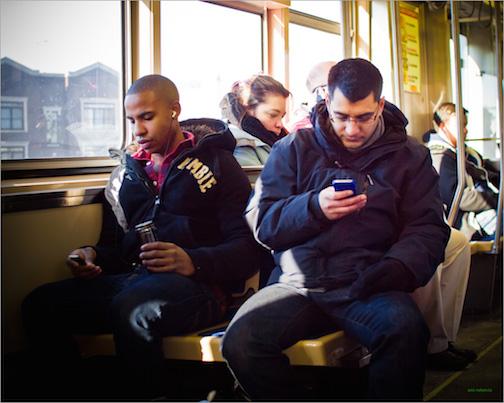Connectedly Disconnected in the Smartphone Culture
October 21, 2014

The phantom ring: it’s that feeling when you just know your phone vibrated in your pocket. You know it was real, you can sense it, that someone is trying to contact you. But when you take a look, it was nothing.
It’s a safe assumption that most of us wake up every morning to our smartphones. We mindlessly stare into its glowing screen before going to sleep and it might even be snuggled next to you in bed.
Then we take it with us everywhere we go. People on every train, walking down the street, driving their car, sitting in class, eating, drinking—you get the idea—people everywhere are locked in, tuned out and glued to these amazing devices that let us talk to anyone, anywhere, all the time.
But isn’t it a bit odd that these things that let us talk to anyone, anywhere, all the time have us so mesmerized that we barely have the ability to function without them?
A while ago, I dropped my old smartphone and the screen shattered and turned black. The five stages of smartphone death set in.
Denial: No, it’ll turn back on. Plug it in or something.
Anger: How could you do this? Who puts their phone on their lap and then stands up, letting it fall on the concrete?!
Bargaining: If only you had that case, that waterproof, bulletproof case!
Depression: All the times we had together, all the texts, YouTube fails.
Acceptance: You realize that your smartphone has become part of your identity.
Maybe these smartphone social networks make us turn into different people—virtual versions of ourselves that only exist in fonts and emoticons. This virtual self becomes the identity that is easier to portray, an ongoing constructed personality that isn’t really you.
You can see this in the way that we don’t actually LOL or HAHA that much, and no one has ever ROTFLMAO. Seriously, not once has that ever happened.
For me, as soon as all of this was settling in, and I felt liberated and alive, that’s when my new smartphone came in the mail—a surprise from my parents who needed it to check in with me.
As much as I felt unplugged, real and independent, I turned that new phone on. I uploaded all my contacts and I was sucked right back into that virtual complex that I had just started to recognize.
The dark and honest truth is that we’d rather text someone than talk to them. That way we can feel like we had a connection—from a safe distance—and spread out the conversation so that we never feel alone in between.
It’s like when someone you’re texting accidentally hits “call” and your phone starts to ring. What is this person doing trying to do, actually talk to me?
There’s something about this compulsive connectivity that makes us drive each other away and get distracted from the people closest to us. In this amazingly connected new culture, we’re strangely disconnected.
There was a time before smartphones when every connection and conversation had time in between them. In that time, people just had to be alone and reflect. It was an important part of the human experience.
But now that we never have to feel bored and alone, we end up always feeling bored and alone.







